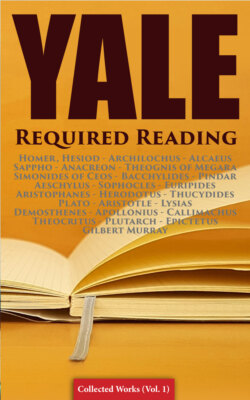Читать книгу Yale Required Reading - Collected Works (Vol. 1) - Anacreon - Страница 147
На сайте Литреса книга снята с продажи.
The Life and Work of Theognis of Megara
ОглавлениеTable of Contents
THEOGNIS of Megara, by far the best preserved of the elegists, owes his immortality to his maxims, the brief statements of practical philosophy which the Greeks called 'Gnômai' and the Romans 'Sentenliœ.' Some are merely moral --
"Fairest is righteousness, and best is health,And sweetest is to win the heart's desire."
Some are bitter --
"Few men can cheat their haters, Kyrnos mine;Only true love is easy to betray!"
Many show the exile waiting for his revenge --
"Drink while they drink, and, though thine heart be galled,Let no man living count the wounds of it:There comes a day for patience, and a dayFor deeds and joy, to all men and to thee!"
Theognis's doctrine is not food for babes. He is a Dorian noble, and a partisan of the bitterest type in a state renowned for its factions. He drinks freely; he speaks of the Demos as 'the vile'or as 'my enemies';once he prays Zeus to "give him their black blood to drink." That was when the Demos had killed all his friends, and driven him to beggary and exile, and the proud man had to write poems for those who entertained him. We hear, for instance, of an elegy on some Syracusans slain in battle. Our extant remains are entirely personal ebullitions of feeling or monitory addresses, chiefly to his squire Kyrnos. His relations with Kyrnos are typical of the Dorian soldier. He takes to battle with him a boy, his equal in station, to whom he is 'like a father'(l. 1049). He teaches him all the duties of Dorian chivalry -- to fight, to suffer in silence, to stick to a friend, to keep clear of falsehood, and to avoid associating with 'base men.' He is pledged to bring the boy back safe, or die on the field himself; and he is disgraced if the boy does not grow up to be a worthy and noble Dorian. In the rest of his relations with the squire, there is some sentiment which we cannot enter into: there were no women in the Dorian camps. It is the mixed gift of good and evil brought by the Dorian invaders to Greece, which the true Greek sometimes over-admired because it was so foreign to him -- self-mastery, courage, grossness, and pride, effective devotion to a narrow class and an uncivilised ideal. Our MSS. of Theognis come from a collection made for educational purposes in the third century B.C., and show that state of interpolation which is characteristic of the schoolbook. Whole passages of Solon, Mimnermus, Tyrtæus, and another elegist Euênus, originally jotted on the margin for purposes of comparison, have now crept into the text. The order of the 'Gnomes' is confused; and we sometimes have what appear to be two separate versions of the same gnome, an original and an abbreviation. There is a certain blindness of frank pride and chivalry, a depth of hatred and love, and a sense of mystery, which make Theognis worthy of the name of poet.
